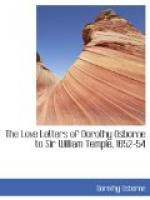Sir Thomas Osborne, a Yorkshire baronet, afterwards Earl of Danby, is a name not unknown in history. He was a cousin of Dorothy; his mother, Elizabeth Danvers, being Dorothy’s aunt. He afterwards married Lady Bridget Lindsay, the Earl of Lindsay’s daughter, and the marriage is mentioned in due course, with Dorothy’s comments. His leadership of the “Country Party,” when the reins of government were taken from the discredited Cabal, is not matter for these pages, neither are we much concerned to know that he was greedy of wealth and honours, corrupt himself, and a corrupter of others. This is the conventional character of all statesmen of all dates and in all ages, reflected in the mirror of envious opposition; no one believes the description to be true. Judged by the moral standard of his contemporaries, he seems to have been at least of average height. How near was Dorothy to the high places of the State when this man and Henry Cromwell were among her suitors! Had she been an ambitious woman, illustrious historians would have striven to do justice to her character in brilliant periods, and there would be no need at this day for her to claim her place among the celebrated women of England.
Sir,—There is nothing moves my charity like gratitude; and when a beggar is thankful for a small relief, I always repent it was not more. But seriously, this place will not afford much towards the enlarging of a letter, and I am grown so dull with living in’t (for I am not willing to confess yet I was always so) as to need all helps. Yet you shall see I will endeavour to satisfy you, upon condition you will tell me why you quarrelled so at your last letter. I cannot guess at it, unless it were that you repented you told me so much of your story, which I am not apt to believe neither, because it would not become our friendship, a great part of it consisting (as I have been taught) in a mutual confidence. And to let you see that I believe it so, I will give you an account of myself, and begin my story, as you did yours, from our parting at Goring House.
I came down hither not half so well pleased as I went up, with an engagement upon me that I had little hope of shaking off, for I had made use of all the liberty my friends would allow me to preserve my own, and ’twould not do; he was so weary of his, that he would part with it upon any terms. As my last refuge I got my brother to go down with him to see his house, who, when he came back, made the relation I wished. He said the seat was as ill as so good a country would permit, and the house so ruined for want of living in’t, as it would ask a good proportion of time and money to make it fit for a woman to confine herself to. This (though it were not much) I was willing to take hold of, and made it considerable enough to break the engagement. I had no quarrel to his person or his fortune, but was in love with neither, and much out of love with a thing called marriage; and have since thanked God I was so, for ’tis not long since one of my brothers writ me word of him that he was killed in a duel, though since I have heard that ’twas the other that was killed, and he is fled upon ’t, which does not mend the matter much. Both made me glad I had ’scaped him, and sorry for his misfortune, which in earnest was the least return his many civilities to me could deserve.




